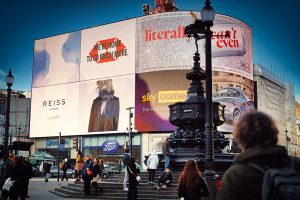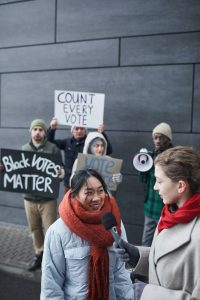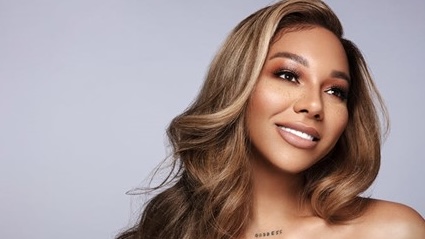Munroe Bergdorf at the Festival of Marketing
Saiesha Munuri
Marketing Editor

The transgender model and activist warns brands that if diversity and inclusion efforts aren’t “connected into reality,” they will become “tokenistic and stale,” referring to her experience at L’Oréal’.
In 2017, as a podcast host and author, Munroe Bergdorf was hired as L’Oréal’s first transgender model. However, she was fired just two days after posting on Facebook about racism, which the brand claimed represented opinions “in conflict” with its principles. As a result, the cosmetics behemoth was roundly chastised for its action, with many questioning how the company could claim to encourage diversity while firing Bergdorf for speaking out against racism. Likewise, consumers were outraged by L’Oréal’s move, questioning how the company could claim to promote diversity and yet terminate Bergdorf for speaking out against prejudice.
Bergdorf explains her experience as “very painful.” Still, in 2020, she re-joined L’Oréal as a member of its UK diversity and inclusion advisory board only after receiving an apology from the brand’s new president Delphine Viguier. On March 25, Bergdorf remarked at the Festival of Marketing: Transform that the decision to re-associate herself with the beauty behemoth was “tough.” In response, Bergdorf states, “Ultimately, it was nice to bury the hatchet, but it was also a great lesson for other brands in humility, in how to admit when you’ve got something wrong, and just listen to people.”
L’Oréal’s decision to welcome Bergdorf into its business came in the wake of international anger at the assassination of George Floyd by US police officers, a period in which many firms were faced with a lack of diversity and inclusion. Bergdorf believes that “what largely white institutions and especially old big companies like L’Oréal that still hadn’t reckoned with a lot of the bias that is wrapped up in their company – is that there’s a lot of unpacking to do. L’Oréal’s decision to backtrack on its 2017 decision was a really good masterclass in dialogue, listening to each other, admitting when you’ve got something wrong, and in how to go about a situation when there’s public furor and people are outraged.”
Bergdorf got her big break in 2014 with a shoot for a couture Lebanese Muslim line, and she went on to star in a Uniqlo commercial in 2016.
However, Bergdorf worked for brands where she thought she was hired for the “shock element.” “It felt very tokenistic at the start, and then marketing caught up with the importance of authenticity. Consumers want to see, and it’s what we deserve,” she said. Uniqlo was the first brand with which she could speak openly about her experiences as a black trans woman in the United Kingdom. It happened simultaneously as a shift in brand message, especially in the beauty industry, from “seeking perfection” to assuring customers they are perfect as it is.
“I’ve really seen within the time that my career has blossomed, the difference in how brands are marketing themselves, and how we need to make sure that [diversity and inclusion] isn’t trivialized, it remains authentic, and brands keep listening to consumers rather than going through trends,” she said.

“It becomes tokenistic or stale very quickly if you aren’t plugged into reality.” Bergdorf cited the recent outpouring of brands condemning Russia’s invasion of Ukraine as an example of how brands can appear to be following a trend.
“If we’re going to be having conversations about Ukraine, we also need to be talking about Palestine,” she said.
“I want to see more brands not just doing the popular thing, but also getting involved in things and calling out injustice when it’s there.” However, she did note that getting things “perfect” isn’t always a struggle for brands. “It’s about going on a journey,” she explained. “The thing about humanity is there are so many different kinds of people and many who still aren’t represented. [But] I think there are many [brands] that are on the right path.” Bergdorf mentioned Rihanna’s Fenty and Mac Cosmetics when asked which firms she admires the most for their diversity and inclusion efforts.
Fenty is a “masterclass” in how to “reframe” diversity, she claimed, with makeup brand Fenty Beauty, skincare brand Fenty Skin, and lingerie brand Savage x Fenty. “For a long time, it was seen as a buzzword, and something that has to be done otherwise [a brand] would be canceled. But true diversity is exciting. Who doesn’t want a brand or product that feels like it’s for everyone? That everyone feels empowered and excited by?” she inquired.
“[Rihanna] has done a great job in showing that diversity and bringing everyone in, creating not just a brand, but a Fenty universe which excites everyone.” Fenty is also branching out into men’s lingerie, which Bergdorf described as “fantastic.” “Unpacking all of these gender labels and roles and which products are for what person, and grappling with all these conversations, is something that benefits everyone,” she added.
I want to see more brands not just doing the popular thing but also getting involved in things and calling out injustice when it’s there.
– Munroe Bergdorf, model and activist
Contact Saiesha at munurisa@shu.edu

